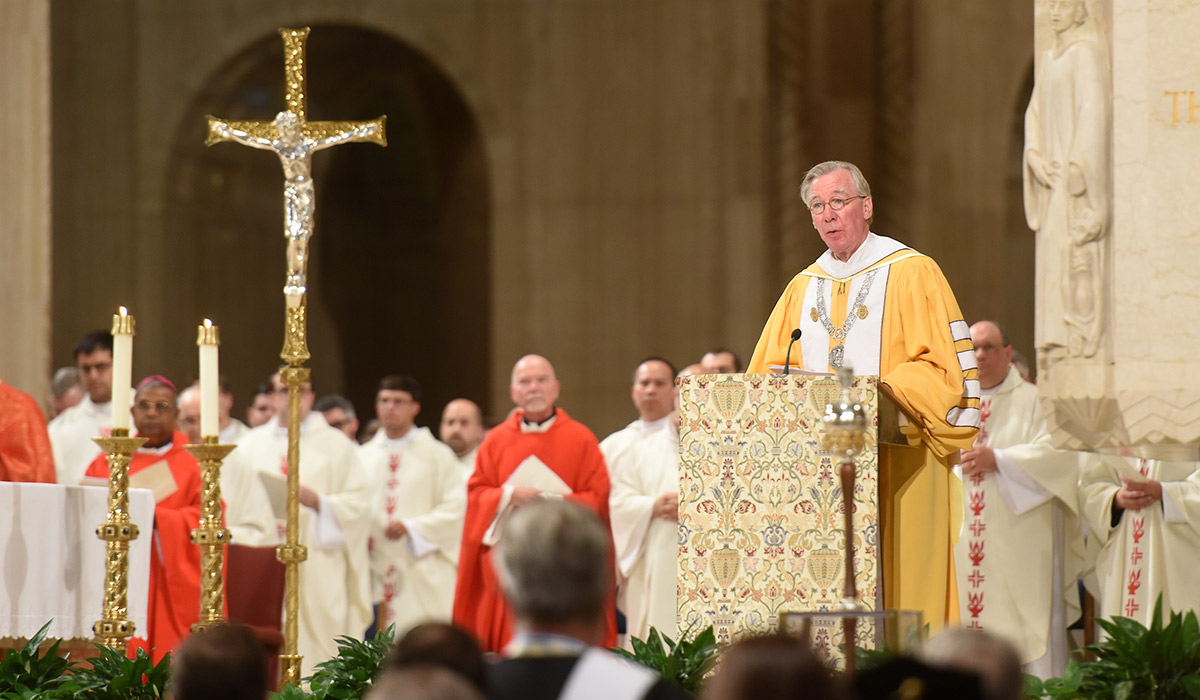

Remarks of President John Garvey
Mass of the Holy Spirit
Upper Church, Basilica of the National Shrine of the Immaculate Conception
Aug. 29, 2019
In a few weeks, on October 13, Pope Francis will officially recognize a new saint, the clergyman and Oxford academic John Henry Newman. Newman was a theologian, poet, and priest of the Church of England, who found his way to the Catholic Church and became a Catholic priest. Pope Leo XIII, who established this University, made him a cardinal.
Newman founded the Catholic University of Ireland in 1854. That foundation didn’t prove as durable as The Catholic University of America. It was eventually reformed as University College Dublin (James Joyce’s alma mater). As a thinker, though, Newman will outlast our own founders (and our current administration). He is remembered even today for the lectures he gave at the establishment of his school. They were published under the title The Idea of a University.
The point of a university education, Newman maintained, is to help students see the world clearly and exercise good judgment. To that end he maintained that they should read widely – history, politics, literature, languages, mathematics, the sciences, philosophy, theology, music and art – seeking truth wherever it may be found, and never shying from controversy or debate. Humility, curiosity, and intellectual honesty are essential virtues for this undertaking.
But a good education is more than books, lectures, papers, and tests. This Newman also knew well. A good education gets us outside ourselves. It counteracts the tendency to stick with settled ways of thinking.
Our relations with other people do something like this. Like education, friendship broadens our perspective. Friends help us see things through other eyes. In this way they enhance our self-awareness and expand our understanding of the world. We might even say that, what education does for our intellectual powers, friendship does for our affective capacities. It expands the scope of our feelings and concern for others.
In a sermon entitled On Love of Relations and Friends Newman suggested that friendship is a kind of training for the practice of universal charity. Friendship challenges us to put others before ourselves in the real circumstances of the everyday.
The best preparation for loving the world at large, and loving it duly and wisely, is to cultivate an intimate friendship and affection towards those who are immediately about us.
It was said of Justice William O. Douglas that he loved humanity but hated people.1 Cardinal Newman didn’t have much respect for people who spoke idealistically about “loving the whole human race,” or who claimed they were “friends of all mankind.”
This is not to love men, it is but to talk about love. The real love of man must depend on practice, and therefore, must begin by exercising itself on our friends around us. By trying to love our relations and friends, by submitting to their wishes, though contrary to our own, by bearing with their infirmities, by overcoming their occasional waywardness by kindness, by dwelling on their excellences, and trying to copy them, thus it is that we form in our hearts that root of charity, which, though small at first, may, like the mustard seed, at last even overshadow the earth.
There is another lesson on friendship that is to be found not in Newman’s writings, but in his life. It’s not a stretch to say that, for Newman, the friends he made were critical to his conversion and sainthood. While at Oxford he befriended a handful of students and professors who shared his religious concerns. In 1833 they formed the Oxford Movement, which sought to renew the Church of England by combating heresy and restoring older Christian traditions.
The friendships that gave rise to the Oxford Movement were also, for Newman, the impetus for several years of study, prayer, and discernment that eventually led to his reception into the Catholic Church. His Anglican friends and family were dismayed. Becoming Catholic wasn’t something respectable people did in 19th century England. Some of his close friends remained loyal, but others grew estranged. Newman didn’t retaliate. Late in life he was able to restore some of those lapsed friendships.
What was true for him is true for all of us. The friends we make in life influence -- to a great extent they determine -- the paths we take in life and the people we become. This is why my wife and I always wanted to know the friends our children made. If they hung out with good people who loved God, loved their families, and worked hard, we knew they would turn out all right.
We form friendships through shared interests and activities. These can be highbrow things like study sessions unpacking Macbeth or practicing German, late-night debates about politics or music. They can be extracurricular activities like lacrosse and Campus Ministry. Even mundane things like having lunch or doing laundry help strengthen the bonds between friends. The important thing is to choose your friends wisely. Find people you admire, and make them your friends.
Newman’s motto on his coat of arms was Cor ad cor loquitur (heart speaks to heart). It’s a phrase he took from St. Francis de Sales, and it refers to prayer. The heart of man speaks to the heart of God. But I think it also refers to the bond between friends when they open their hearts to one another.
A good education opens us up to new ideas and teaches us how to think and choose well as we navigate the world. Friendship helps us get beyond our natural circle of self-interest, so we can live and do well for one another. Friends also help form us, and it’s important to surround ourselves with good ones. It is my hope that at Catholic University you will find both -- a good education and good friends.
1Noah Feldman, Bad temperament alone shouldn’t sink Kavanaugh, Chicago Tribune (October 4, 2018).